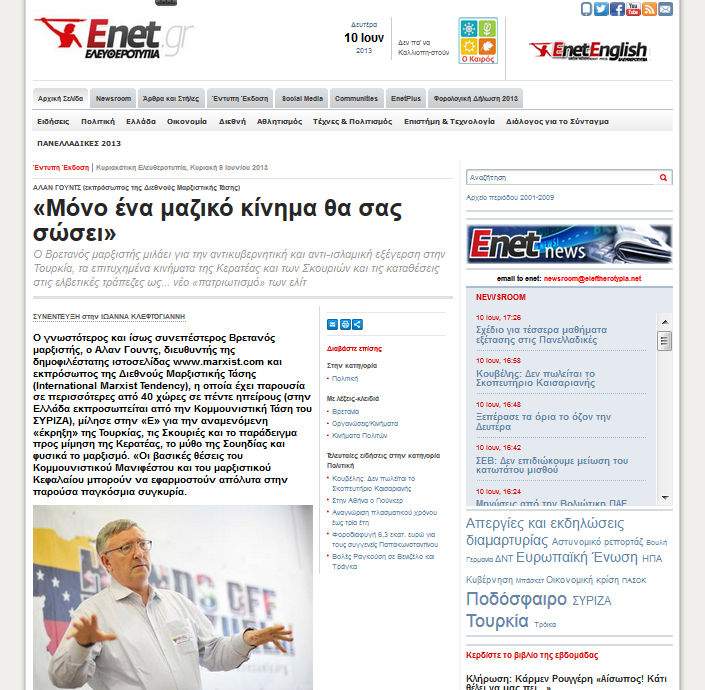Yesterday, one of the leading daily papers in Greece, the left-leaning Eleftheropia (“Free Press”) published a full-page interview with the political editor of Marxist.com, Alan Woods. We publish here a complete English translation of this interview.
 The British Marxist talks about the anti-government and anti-Islamic insurgency in Turkey, the successful movements in Skouries and Keratea and says the money stashed away in Swiss banks is the new "patriotism" of the elite.
The British Marxist talks about the anti-government and anti-Islamic insurgency in Turkey, the successful movements in Skouries and Keratea and says the money stashed away in Swiss banks is the new "patriotism" of the elite.
Interview by Ioanna Kleftogiannis
The best known and perhaps most consistent British Marxist, Alan Woods, director of the attractive website www.marxist.com and representative of the International Marxist Tendency (IMT), which has a presence in more than 40 countries on five continents (represented in Greece by the Communist Tendency of SYRIZA), spoke to Eleftherotipia about the social explosion in Turkey, following in the footsteps of Keratea, about the myth of Sweden and, of course, about Marxism.
"The central arguments of the Communist Manifesto and Marx’s Capital are fully applicable to the present global juncture. A democratically planned socialist economy, based on the nationalization of banks and big corporations under the democratic control of the workers, is the only alternative for people living today," he says.
 Q: The protests in Turkey developed from an argument about a park into a nationwide antigovernment explosion. What interpretation can you give for this unexpected reaction?
Q: The protests in Turkey developed from an argument about a park into a nationwide antigovernment explosion. What interpretation can you give for this unexpected reaction?
A: The capitalist analysts are scratching their heads over this. Turkey had both a very rapid galloping growth rate and stability and was thus considered a model. But the unexpected explosion betrayed the existence of seething discontent beneath the surface. The policy of the ruling party is repressive and undemocratic. Erdogan is very arrogant and has delusions of grandeur. He took Turkey to the brink of war with Syria while at the same time he increased inequality. But despite his claims that the insurrectionary movement consist of "extremists", it shows a remarkably broad character. In the ranks of the protesters there are workers and students, pensioners and Kurds, even fans of rival football clubs – Fenerbahce, Besiktas, Galatasaray. The red flags of socialist and communist organizations fly alongside the portrait of Mustafa Kemal; the flags of the Kurds are seen together with the flags of the Turkish nationalists. Such things would have been unthinkable in the past
Q: What will the long-term result of this uprising be?
A: It will help to undermine the popularity of the Islamists in other countries and at the same time to strengthen the revolution against Islamist governments in Tunisia and Egypt. Last but not least, the events in Turkey can help put an end to the age-old discord between Greece and Turkey. The workers of the two countries have the same problems and are fighting against the same enemy. It is high time we united in a common international working class struggle against the dictatorship of Capital.
Q: Until recently the impression was promoted that the Swedish welfare state is the model to follow...
A: The Swedish model is a myth. According to the Organisation for Economic Cooperation and Development (OECD), Sweden is the country in which inequality has increased most in the last three decades. Youth unemployment has reached 25%. In Chasmpi, one of the centres of the riots, unemployment has hit 38%. And this is not an isolated phenomenon. Young people rebelled in Paris in 2005, in Athens in 2008 and in London in 2011.This is a symptom of the impasse of the capitalist system, but also a foretaste of the coming revolutionary mobilizations.
Q: What does the Greek crisis really signify?
A: The Greek crisis is part of the general crisis of European and global capitalism. Lenin explained that capitalism breaks at its weakest link. Until recently, that was Greece...
Q: Could Greece have avoided the IMF and the German blackmail?
A: Once Greece joined the EU, it was bound to be subject to the pressures of Brussels and Berlin. In reality, national sovereignty does not exist. Foreign bankers and capitalists decide everything, especially Germany. The Greek ruling class knew this when they signed up for the EU and the Eurozone. As long as the boom lasted, they got huge profits out of it. But the slump that began in 2008 exposed the extreme weakness of Greek capitalism. Now the Greek bankers and capitalists (and quite a few politicians) are sending their money to Swiss banks. That is the true meaning of their “patriotism”!
Q: Should Greece remain in the Euro?
A: Greece may be forced to leave the Eurozone. But this will solve nothing. The drachma would fall like a stone, leading to a horrific collapse, similar to that which occurred in Germany in 1923. On the other hand, if Greece remains in the Euro, it would have to endure unemployment, poverty and misery, possibly for decades.
Skouries and Keratea*
Q: Do you think that the people of Skouries should follow the example of Keratea in order to win victory?
A: I know that the people are fighting valiantly to defend their rights against the foreign bandits and the Greek government, which is the local representation of the foreign bankers and monopolies. Taking advantage of the economic crisis, these sharks wish to plunder Greece of all its resources. The government is resorting to brutal police repression against its own people. These politicians are very brave when attacking unarmed demonstrators. But when it comes to the Troika and the big foreign monopolies they grovel like cowards. The example of Keratea proves that mass actions and counteractions can be successful. The conclusion is clear. Only the movement of the masses can save Greece. However, in order to succeed, a genuine revolutionary programme and leadership is needed.
Q: Should the UK remain in the European Union?
A: Whether inside or outside the EU, the UK has no future on a capitalist basis. And this is even truer in the case of Greece.
Q: Did you also open a bottle of champagne when they announced the death of Thatcher?
A: Unfortunately, I can’t afford champagne! But what the death of Thatcher exposed was the existence of deep class divisions in British society.
---
[*Note: In December 2010, riots broke out in Keratea (a suburb outside Athens), because the then PASOK government wanted to approve plans of a big contractor to build landfill site in the area. The people were opposed, and together with their mayor decided to organise mass pickets and the whole area became a battlefield for months. It was an example of the generalized anger in society against the policies of the government. The government decided to suspend the project and the police left the area after almost 130 days of clashes.
In Skouries, Chalkidiki (Northern Greece), there has been a similar situation for months. A famous Greek capitalist, together with a Canadian company, plans to start the mining of gold and the people of Chalkidiki are strongly opposed. The whole investment is very dubious. Even the European Commission came out against the company, because it paid very little money and none of it went to the Greek state. They have invested 11,000,000 euros and they will profit 20 billion! But the PASOK government appealed to the General Court for the cancellation of that decision!
Also, the starting of the mining requires the destruction of a big forest area, and all the experts say that the chemical elements produced by the mining process will be extremely dangerous for the life of the people in a large part of Northern Greece (including Thessaloniki, the second largest city).
So for months now, the people have been protesting, and the government is using police repression. The police have thrown tear gas in schools, they have beaten up people in every demonstration and they have even arrested people from their houses, at night. A few days ago, there was a concert against the investment that was attended by 10,000 local citizens and activists from other parts of the country.]